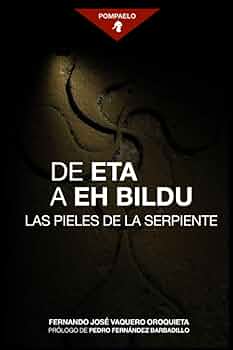

Fernando José Vaquero Oroquieta holds a degree in law from the University of Navarra and is a criminologist from the University of the Basque Country. Co-author of La tregua de ETA: mentiras, tópicos, esperanzas y propuestas (2006) and author of several books, including La ruta del odio (2010), De Navarra a Nafarroa, La otra conquista (2019), and Biografía no autorizada del PNV (2022). We talk about his latest book, De ETA a EH Bildu: Las pieles de la serpiente (From ETA to EH Bildu: The Skins of the Serpent), and the electoral growth of radical Basque separatism.
That is true, but the reality is that Bildu is an organisation that would have been impossible without the terrorist group ETA, which killed almost 1,000 people. That represents its ideological culmination. The ‘political front’ has been a tool of the ‘armed struggle’ from the beginning. ETA held its Fifth Assembly in 1966—it was born as EKIN in 1951 and changed its name to ETA and carried out its first attacks ten years later—in which it declared itself Marxist-Leninist, approved the use of revolutionary warfare, and decided to split the organisation into four fronts: political, cultural, military, and economic. From that moment on, there was a struggle between those who believed that the military aspect should set the political agenda and those who believed the opposite. Finally, the tactic of the ‘leading bloc’ was established, in which the military side “directs, animates, and controls” all the social arms of the Basque National Liberation Movement: the political, cultural, and economic front, as well as the feminist, internationalist, and youth fronts. This political bloc lasted until 2018, when ETA first paralysed its actions and then said it was dissolving as a ‘political actor.’
Yes, Herri Batasuna and the other pro-independence parties that are integrated into it come from there, and once they are outlawed, new brands appear that continue their work and, in many cases, are also outlawed: Sozialista Abertzaleak, Amaiur, Euskal Herritarrok, Partido Comunista de las Tierras Vascas (Communist Party of the Basque Lands), etc. Sortu, legalised in 2012, and later Bildu are yet more creations of the ‘leading bloc,’ which is the strategic heart of the nationalist Left and of ETA, which are one and the same.
Yes, there are a total of 144 former ETA members on the lists of the nationalist Left, and no less than 15 members of Sortu’s Central Committee have been tried and sentenced for belonging to ETA. In other words, Sortu is not a conventional party; it is a Leninist party under a democratic guise and a continuation of the same strategy.
Because they present statutes that are acceptable to the ministry of the interior and sign a declaration against violence. But this is important; it is a generic declaration against violence, i.e., it is not a rejection of ETA’s ‘struggle,’ but of the violence generated in the Basque Country, which, as they understand it, is initiated by the state, the police, etc.
It is nothing more than a formal acceptance of bourgeois and Spanish democracy, but because they understand that the historical cycle is no longer prone to terrorism, just as their political models, such as Soviet or Albanian communism, are no longer useful utopias, and that leads to the expansion of subjective rights and the empowerment of minorities as new revolutionary subjects of social change: women, racial minorities, transgender people, etc.
Not really, because they have always been Gramscians. They have always understood that the rifle is the spearhead of the people, but that to bring about changes in society, you have to generate a cultural change. For example, if the paradigm of the model Basque in Sabino Arana’s time was a daily Mass Catholic with eight Basque surnames, over the years that has disappeared, and what remains is the Basque who speaks Basque to build a nation. This is valid for the PNV (Basque Nationalist Party) and for the nationalist Left. Being Basque is only recognised in those who speak Basque, and that is why you can see nationalist propaganda in which people of different races call for independence.
Of course, because there has been no social or political majority for this, there has been no will on the part of the Popular Party. Many documents could be presented: sentences, declarations, the database of the 3,000 members of ETA, and their membership in different political organisations, but there is a clear lack of political will.
They are the same people who form part of a whole network of shared strategies and financing and of material, economic, and electoral feedback. This is Basque national construction by de facto and de jure means. In de facto terms, by controlling society, symbols, and language. In the way of law, by means of laws such as the law of democratic memory in Euskadi, the law of the Basque language in Navarre, or the cooperation agreements between the administrations of the Basque Country and Navarre. And, at the same time, to empty the Spanish presence of content so that there are no flags and Spain is not mentioned in education, universities, or the media. In the Basque Country, it is possible to live without any Spanish awareness, and that is what happens to most young people who have grown up in linguistic nationalism.
Yes, unfortunately, the result of the Basque elections is not surprising. On the one hand, most of the Podemos vote has gone to Bildu, which, because of everything we mentioned earlier, has an enormous presence and capacity to work. On the other hand, Bildu is connecting very well with young people by appealing to social issues, while the PNV, in a way, is becoming an old party, voted for by older people, and many consider that it should give way to a new cycle. It is only a matter of time before radical separatism becomes the leading political force in the Basque Country.
Bildu wants to form part of the government because they know, as Arnaldo Otegui pointed out at the Aberri Eguna (Day of the Basque Homeland), that to achieve independence they have to take several steps, and one of them is to be present in the government of the Basque Country and Navarre. For Bildu, an alliance with the PNV would be to achieve an old Basque nationalist strategy: the Basque national front. If the PNV prefers to make a pact with the Socialists, which seems most likely, then they will accuse them, as they have done many times before, of being bourgeois, traitors, and Spanishists. The ultimate goal is independence, and Arnaldo Otegui has set 2030 as the date for this process, although they are aware of the difficulty in the current European context. However, Bildu is keeping a close eye on what is happening in Catalonia because, after the failure of the Ibarreche plan, Basque separatism has handed over the baton to Catalan separatism.
Thanks to the efforts made by both parties, they have gained a few thousand votes, yes, but the reality is that the constitutionalist vote is going to be reduced due to a generational issue, and there is not going to be a turnaround in the short or medium term; this cannot be resolved with an electoral campaign. Moreover, the centre-right is increasingly isolated because the constitutionalist Left and the socialists agree with the progressive, woke, LGBT, and feminist agenda of Bildu and even with the PNV.
In the Basque Country, there is a society that is very conformist with the current power of nationalism, in which there are hardly any critical elements and which has very little memory of the pain of the victims of terrorism, a pain that a majority contemplates with absolute indifference.
